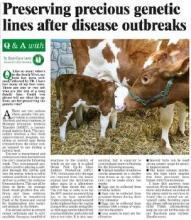Like so many others in the South West, my herd has been seriously affected by TB. I have lost many of my best cows. There are one or two left who are the last of a long family line. Could you please tell me what the options are for preserving the genetic line?
There are two options where genetic line preservation is concerned. The first, and most common, is Multiple Ovulation Embryo Transfer (MOET), a conventional embryo flush. This procedure involves a 5 week superovulation program, resulting in several eggs being released from the donor cow, as opposed to one during a natural heat. The cow is inseminated and embryos are then flushed from the cow’s uterus the following week. This non-surgical procedure involves placing a catheter through the cervix and into the uterus, where a cuff is inflated and fluid is flushed in and out to collect the embryos from each horn. This can all be done on farm. An average flush would produce 6 embryos and those embryos could either be transferred fresh or be frozen and stored for implantation into recipient animals in the future.
The second option is a much newer technique and is only available through a handful of practices in the country, of which we are one. It is called Ovum Pick Up/In Vitro Embryo Production (OPU/IVP). In this case only the eggs are removed from the donor animal and the fertilisation takes place in a laboratory rather than inside the cow. The cow has to come to us for the OPU session as everything has to be heat controlled. Under epidural, an ultrasound probe is placed into the vagina along with a needle and guide, so that eggs can be taken from ovarian follicles and collected into a test tube. It is also non-surgical, but is superior to conventional embryo flushing for the following reasons:
- A larger number of embryos can be generated in a shorter time frame as an egg collection can be made every two weeks
- Eggs can be collected from juvenile heifers
- Eggs can be collected from pregnant donors during their first trimester
- Eggs can be collected from animals with a range of reproductive disorders
- Less semen is used per fertilisation
- Several bulls can be used giving greater scope for genetic improvement
- The latest science minimises the high birth weights that have previously been linked with this technique
I hope this answers your question. If you would like any more information on either of the above embryo services or would like to attend our advanced cattle breeding open day, please call our practice on 01363 772860. Alternatively, keep an eye out for the date on our facebook page @stbonifacefarmvets.



